TOU221: Sustainable Tourism Essay: Ecotourism, Geotourism, and More
VerifiedAdded on 2023/06/03
|6
|1382
|78
Essay
AI Summary
This essay explores the multifaceted concept of sustainable tourism, examining its core components and their interrelationships. It delves into ecotourism, highlighting its role in preserving natural areas and supporting local communities, and geotourism, which emphasizes the preservation of a region's unique geographical character. The essay also analyzes responsible tourism, focusing on minimizing negative environmental and social impacts, and cultural tourism, which promotes the preservation of cultural heritage. Through a review of key literature and real-world examples, the essay argues that these components collectively contribute to the broader goals of sustainable tourism, fostering a balance between environmental conservation, sociocultural preservation, and economic development. The essay emphasizes how these different forms of tourism can contribute to environmental and economic sustainability. The paper also emphasizes the importance of responsible tourism, cultural tourism and how all these components relate to sustainable tourism.
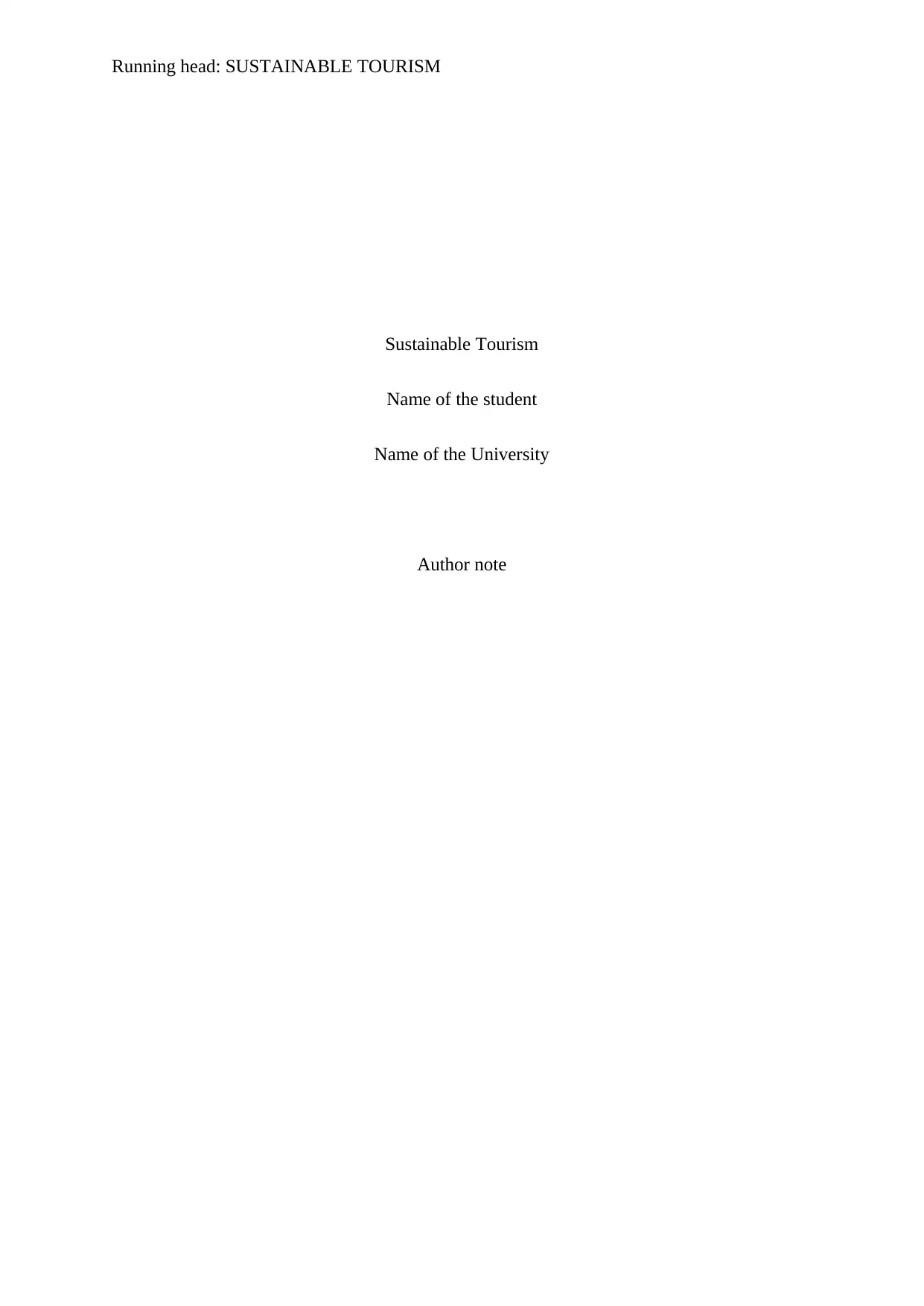
Running head: SUSTAINABLE TOURISM
Sustainable Tourism
Name of the student
Name of the University
Author note
Sustainable Tourism
Name of the student
Name of the University
Author note
Paraphrase This Document
Need a fresh take? Get an instant paraphrase of this document with our AI Paraphraser
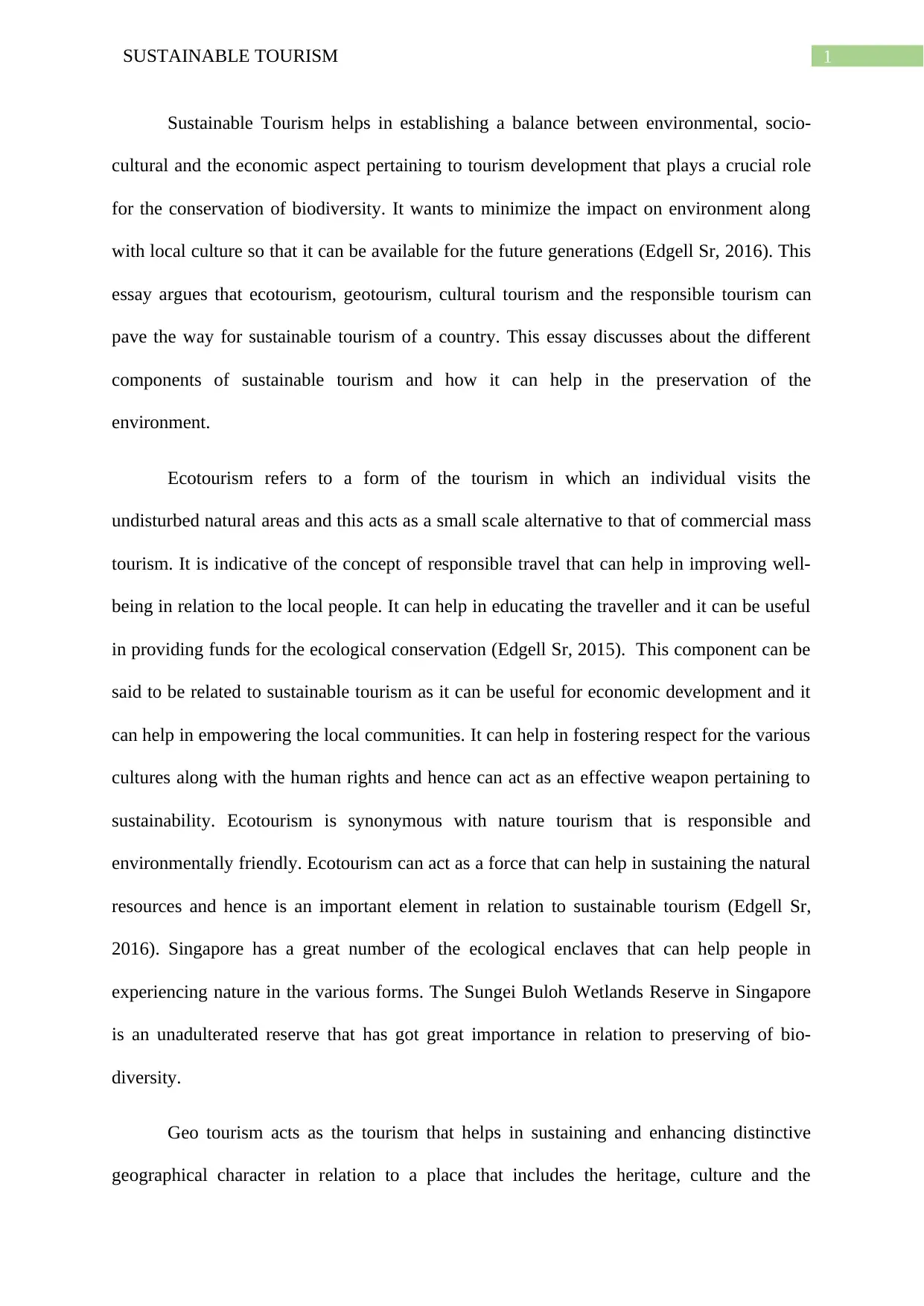
1SUSTAINABLE TOURISM
Sustainable Tourism helps in establishing a balance between environmental, socio-
cultural and the economic aspect pertaining to tourism development that plays a crucial role
for the conservation of biodiversity. It wants to minimize the impact on environment along
with local culture so that it can be available for the future generations (Edgell Sr, 2016). This
essay argues that ecotourism, geotourism, cultural tourism and the responsible tourism can
pave the way for sustainable tourism of a country. This essay discusses about the different
components of sustainable tourism and how it can help in the preservation of the
environment.
Ecotourism refers to a form of the tourism in which an individual visits the
undisturbed natural areas and this acts as a small scale alternative to that of commercial mass
tourism. It is indicative of the concept of responsible travel that can help in improving well-
being in relation to the local people. It can help in educating the traveller and it can be useful
in providing funds for the ecological conservation (Edgell Sr, 2015). This component can be
said to be related to sustainable tourism as it can be useful for economic development and it
can help in empowering the local communities. It can help in fostering respect for the various
cultures along with the human rights and hence can act as an effective weapon pertaining to
sustainability. Ecotourism is synonymous with nature tourism that is responsible and
environmentally friendly. Ecotourism can act as a force that can help in sustaining the natural
resources and hence is an important element in relation to sustainable tourism (Edgell Sr,
2016). Singapore has a great number of the ecological enclaves that can help people in
experiencing nature in the various forms. The Sungei Buloh Wetlands Reserve in Singapore
is an unadulterated reserve that has got great importance in relation to preserving of bio-
diversity.
Geo tourism acts as the tourism that helps in sustaining and enhancing distinctive
geographical character in relation to a place that includes the heritage, culture and the
Sustainable Tourism helps in establishing a balance between environmental, socio-
cultural and the economic aspect pertaining to tourism development that plays a crucial role
for the conservation of biodiversity. It wants to minimize the impact on environment along
with local culture so that it can be available for the future generations (Edgell Sr, 2016). This
essay argues that ecotourism, geotourism, cultural tourism and the responsible tourism can
pave the way for sustainable tourism of a country. This essay discusses about the different
components of sustainable tourism and how it can help in the preservation of the
environment.
Ecotourism refers to a form of the tourism in which an individual visits the
undisturbed natural areas and this acts as a small scale alternative to that of commercial mass
tourism. It is indicative of the concept of responsible travel that can help in improving well-
being in relation to the local people. It can help in educating the traveller and it can be useful
in providing funds for the ecological conservation (Edgell Sr, 2015). This component can be
said to be related to sustainable tourism as it can be useful for economic development and it
can help in empowering the local communities. It can help in fostering respect for the various
cultures along with the human rights and hence can act as an effective weapon pertaining to
sustainability. Ecotourism is synonymous with nature tourism that is responsible and
environmentally friendly. Ecotourism can act as a force that can help in sustaining the natural
resources and hence is an important element in relation to sustainable tourism (Edgell Sr,
2016). Singapore has a great number of the ecological enclaves that can help people in
experiencing nature in the various forms. The Sungei Buloh Wetlands Reserve in Singapore
is an unadulterated reserve that has got great importance in relation to preserving of bio-
diversity.
Geo tourism acts as the tourism that helps in sustaining and enhancing distinctive
geographical character in relation to a place that includes the heritage, culture and the
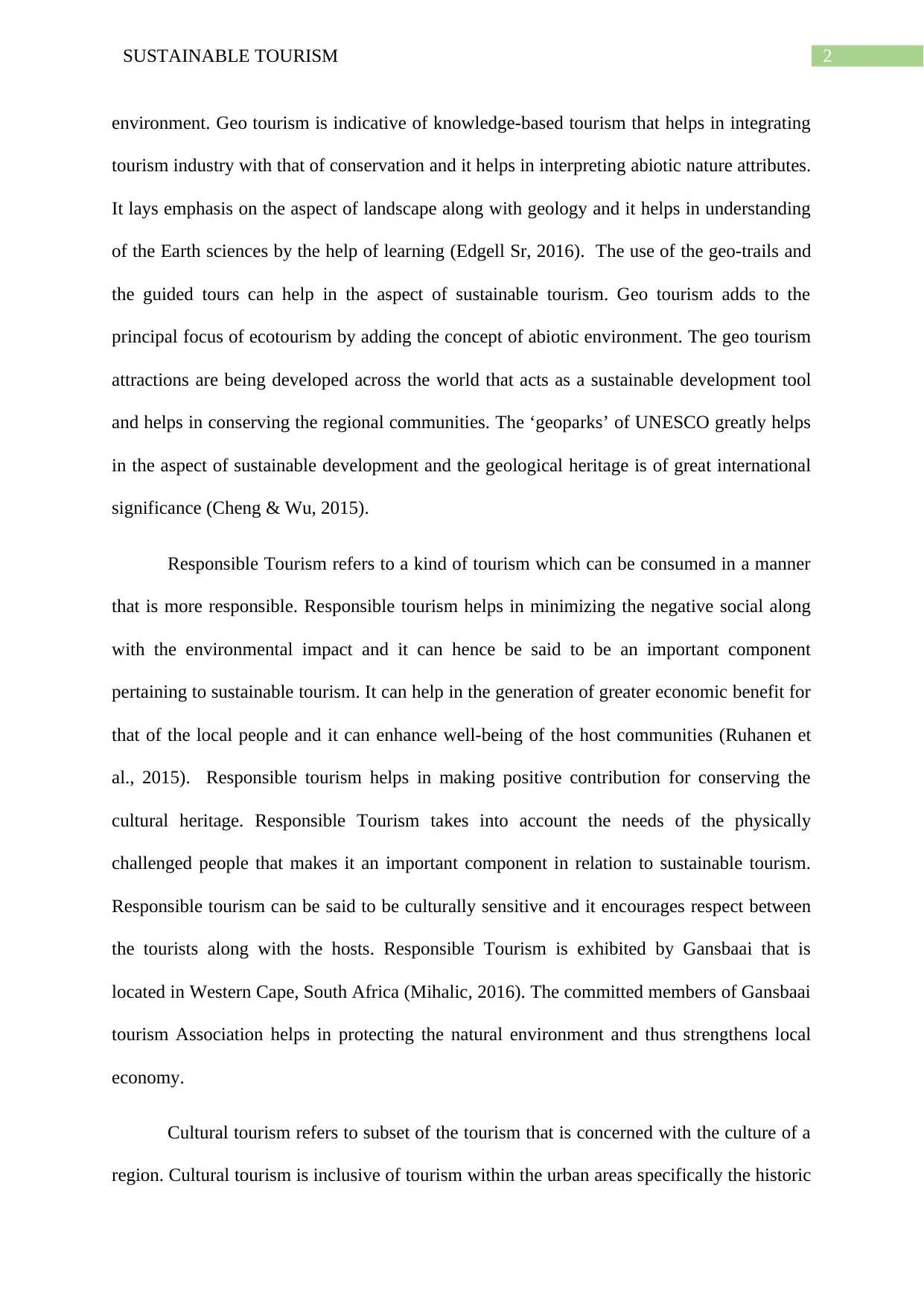
2SUSTAINABLE TOURISM
environment. Geo tourism is indicative of knowledge-based tourism that helps in integrating
tourism industry with that of conservation and it helps in interpreting abiotic nature attributes.
It lays emphasis on the aspect of landscape along with geology and it helps in understanding
of the Earth sciences by the help of learning (Edgell Sr, 2016). The use of the geo-trails and
the guided tours can help in the aspect of sustainable tourism. Geo tourism adds to the
principal focus of ecotourism by adding the concept of abiotic environment. The geo tourism
attractions are being developed across the world that acts as a sustainable development tool
and helps in conserving the regional communities. The ‘geoparks’ of UNESCO greatly helps
in the aspect of sustainable development and the geological heritage is of great international
significance (Cheng & Wu, 2015).
Responsible Tourism refers to a kind of tourism which can be consumed in a manner
that is more responsible. Responsible tourism helps in minimizing the negative social along
with the environmental impact and it can hence be said to be an important component
pertaining to sustainable tourism. It can help in the generation of greater economic benefit for
that of the local people and it can enhance well-being of the host communities (Ruhanen et
al., 2015). Responsible tourism helps in making positive contribution for conserving the
cultural heritage. Responsible Tourism takes into account the needs of the physically
challenged people that makes it an important component in relation to sustainable tourism.
Responsible tourism can be said to be culturally sensitive and it encourages respect between
the tourists along with the hosts. Responsible Tourism is exhibited by Gansbaai that is
located in Western Cape, South Africa (Mihalic, 2016). The committed members of Gansbaai
tourism Association helps in protecting the natural environment and thus strengthens local
economy.
Cultural tourism refers to subset of the tourism that is concerned with the culture of a
region. Cultural tourism is inclusive of tourism within the urban areas specifically the historic
environment. Geo tourism is indicative of knowledge-based tourism that helps in integrating
tourism industry with that of conservation and it helps in interpreting abiotic nature attributes.
It lays emphasis on the aspect of landscape along with geology and it helps in understanding
of the Earth sciences by the help of learning (Edgell Sr, 2016). The use of the geo-trails and
the guided tours can help in the aspect of sustainable tourism. Geo tourism adds to the
principal focus of ecotourism by adding the concept of abiotic environment. The geo tourism
attractions are being developed across the world that acts as a sustainable development tool
and helps in conserving the regional communities. The ‘geoparks’ of UNESCO greatly helps
in the aspect of sustainable development and the geological heritage is of great international
significance (Cheng & Wu, 2015).
Responsible Tourism refers to a kind of tourism which can be consumed in a manner
that is more responsible. Responsible tourism helps in minimizing the negative social along
with the environmental impact and it can hence be said to be an important component
pertaining to sustainable tourism. It can help in the generation of greater economic benefit for
that of the local people and it can enhance well-being of the host communities (Ruhanen et
al., 2015). Responsible tourism helps in making positive contribution for conserving the
cultural heritage. Responsible Tourism takes into account the needs of the physically
challenged people that makes it an important component in relation to sustainable tourism.
Responsible tourism can be said to be culturally sensitive and it encourages respect between
the tourists along with the hosts. Responsible Tourism is exhibited by Gansbaai that is
located in Western Cape, South Africa (Mihalic, 2016). The committed members of Gansbaai
tourism Association helps in protecting the natural environment and thus strengthens local
economy.
Cultural tourism refers to subset of the tourism that is concerned with the culture of a
region. Cultural tourism is inclusive of tourism within the urban areas specifically the historic
⊘ This is a preview!⊘
Do you want full access?
Subscribe today to unlock all pages.

Trusted by 1+ million students worldwide
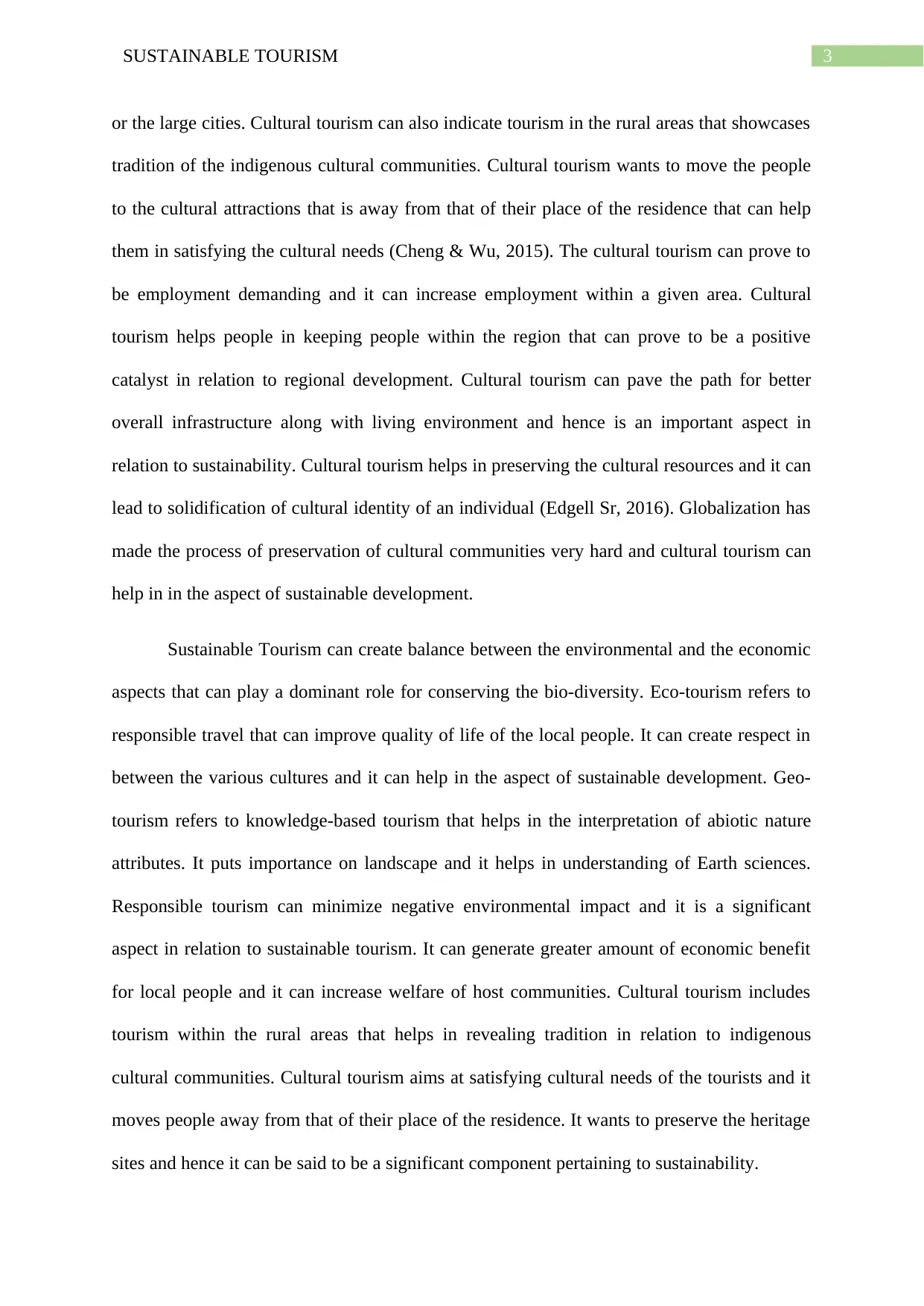
3SUSTAINABLE TOURISM
or the large cities. Cultural tourism can also indicate tourism in the rural areas that showcases
tradition of the indigenous cultural communities. Cultural tourism wants to move the people
to the cultural attractions that is away from that of their place of the residence that can help
them in satisfying the cultural needs (Cheng & Wu, 2015). The cultural tourism can prove to
be employment demanding and it can increase employment within a given area. Cultural
tourism helps people in keeping people within the region that can prove to be a positive
catalyst in relation to regional development. Cultural tourism can pave the path for better
overall infrastructure along with living environment and hence is an important aspect in
relation to sustainability. Cultural tourism helps in preserving the cultural resources and it can
lead to solidification of cultural identity of an individual (Edgell Sr, 2016). Globalization has
made the process of preservation of cultural communities very hard and cultural tourism can
help in in the aspect of sustainable development.
Sustainable Tourism can create balance between the environmental and the economic
aspects that can play a dominant role for conserving the bio-diversity. Eco-tourism refers to
responsible travel that can improve quality of life of the local people. It can create respect in
between the various cultures and it can help in the aspect of sustainable development. Geo-
tourism refers to knowledge-based tourism that helps in the interpretation of abiotic nature
attributes. It puts importance on landscape and it helps in understanding of Earth sciences.
Responsible tourism can minimize negative environmental impact and it is a significant
aspect in relation to sustainable tourism. It can generate greater amount of economic benefit
for local people and it can increase welfare of host communities. Cultural tourism includes
tourism within the rural areas that helps in revealing tradition in relation to indigenous
cultural communities. Cultural tourism aims at satisfying cultural needs of the tourists and it
moves people away from that of their place of the residence. It wants to preserve the heritage
sites and hence it can be said to be a significant component pertaining to sustainability.
or the large cities. Cultural tourism can also indicate tourism in the rural areas that showcases
tradition of the indigenous cultural communities. Cultural tourism wants to move the people
to the cultural attractions that is away from that of their place of the residence that can help
them in satisfying the cultural needs (Cheng & Wu, 2015). The cultural tourism can prove to
be employment demanding and it can increase employment within a given area. Cultural
tourism helps people in keeping people within the region that can prove to be a positive
catalyst in relation to regional development. Cultural tourism can pave the path for better
overall infrastructure along with living environment and hence is an important aspect in
relation to sustainability. Cultural tourism helps in preserving the cultural resources and it can
lead to solidification of cultural identity of an individual (Edgell Sr, 2016). Globalization has
made the process of preservation of cultural communities very hard and cultural tourism can
help in in the aspect of sustainable development.
Sustainable Tourism can create balance between the environmental and the economic
aspects that can play a dominant role for conserving the bio-diversity. Eco-tourism refers to
responsible travel that can improve quality of life of the local people. It can create respect in
between the various cultures and it can help in the aspect of sustainable development. Geo-
tourism refers to knowledge-based tourism that helps in the interpretation of abiotic nature
attributes. It puts importance on landscape and it helps in understanding of Earth sciences.
Responsible tourism can minimize negative environmental impact and it is a significant
aspect in relation to sustainable tourism. It can generate greater amount of economic benefit
for local people and it can increase welfare of host communities. Cultural tourism includes
tourism within the rural areas that helps in revealing tradition in relation to indigenous
cultural communities. Cultural tourism aims at satisfying cultural needs of the tourists and it
moves people away from that of their place of the residence. It wants to preserve the heritage
sites and hence it can be said to be a significant component pertaining to sustainability.
Paraphrase This Document
Need a fresh take? Get an instant paraphrase of this document with our AI Paraphraser

4SUSTAINABLE TOURISM
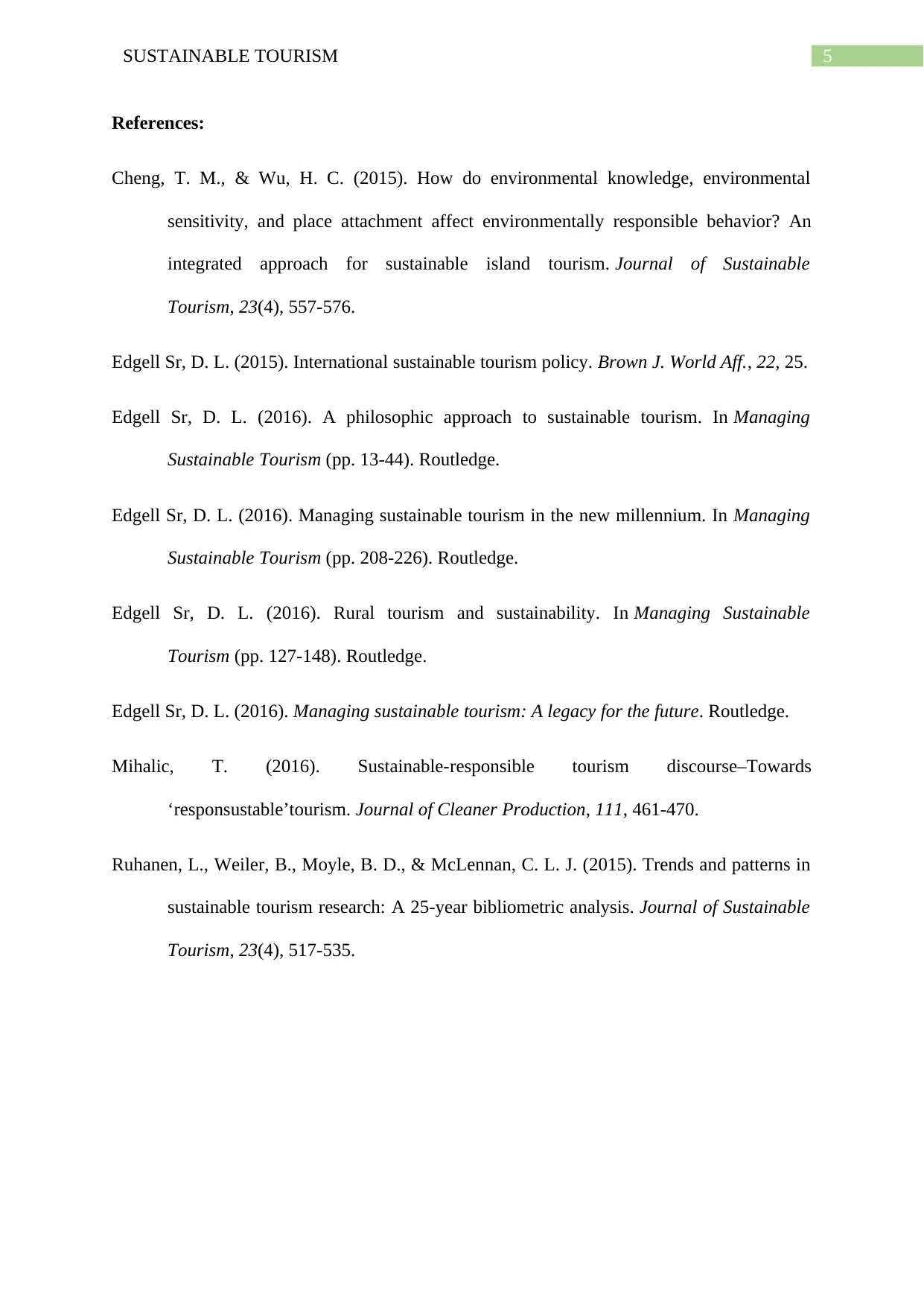
5SUSTAINABLE TOURISM
References:
Cheng, T. M., & Wu, H. C. (2015). How do environmental knowledge, environmental
sensitivity, and place attachment affect environmentally responsible behavior? An
integrated approach for sustainable island tourism. Journal of Sustainable
Tourism, 23(4), 557-576.
Edgell Sr, D. L. (2015). International sustainable tourism policy. Brown J. World Aff., 22, 25.
Edgell Sr, D. L. (2016). A philosophic approach to sustainable tourism. In Managing
Sustainable Tourism (pp. 13-44). Routledge.
Edgell Sr, D. L. (2016). Managing sustainable tourism in the new millennium. In Managing
Sustainable Tourism (pp. 208-226). Routledge.
Edgell Sr, D. L. (2016). Rural tourism and sustainability. In Managing Sustainable
Tourism (pp. 127-148). Routledge.
Edgell Sr, D. L. (2016). Managing sustainable tourism: A legacy for the future. Routledge.
Mihalic, T. (2016). Sustainable-responsible tourism discourse–Towards
‘responsustable’tourism. Journal of Cleaner Production, 111, 461-470.
Ruhanen, L., Weiler, B., Moyle, B. D., & McLennan, C. L. J. (2015). Trends and patterns in
sustainable tourism research: A 25-year bibliometric analysis. Journal of Sustainable
Tourism, 23(4), 517-535.
References:
Cheng, T. M., & Wu, H. C. (2015). How do environmental knowledge, environmental
sensitivity, and place attachment affect environmentally responsible behavior? An
integrated approach for sustainable island tourism. Journal of Sustainable
Tourism, 23(4), 557-576.
Edgell Sr, D. L. (2015). International sustainable tourism policy. Brown J. World Aff., 22, 25.
Edgell Sr, D. L. (2016). A philosophic approach to sustainable tourism. In Managing
Sustainable Tourism (pp. 13-44). Routledge.
Edgell Sr, D. L. (2016). Managing sustainable tourism in the new millennium. In Managing
Sustainable Tourism (pp. 208-226). Routledge.
Edgell Sr, D. L. (2016). Rural tourism and sustainability. In Managing Sustainable
Tourism (pp. 127-148). Routledge.
Edgell Sr, D. L. (2016). Managing sustainable tourism: A legacy for the future. Routledge.
Mihalic, T. (2016). Sustainable-responsible tourism discourse–Towards
‘responsustable’tourism. Journal of Cleaner Production, 111, 461-470.
Ruhanen, L., Weiler, B., Moyle, B. D., & McLennan, C. L. J. (2015). Trends and patterns in
sustainable tourism research: A 25-year bibliometric analysis. Journal of Sustainable
Tourism, 23(4), 517-535.
⊘ This is a preview!⊘
Do you want full access?
Subscribe today to unlock all pages.

Trusted by 1+ million students worldwide
1 out of 6
Related Documents
Your All-in-One AI-Powered Toolkit for Academic Success.
+13062052269
info@desklib.com
Available 24*7 on WhatsApp / Email
![[object Object]](/_next/static/media/star-bottom.7253800d.svg)
Unlock your academic potential
Copyright © 2020–2025 A2Z Services. All Rights Reserved. Developed and managed by ZUCOL.



